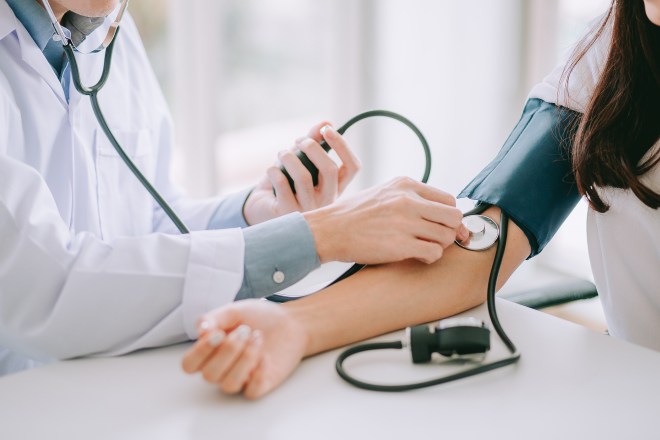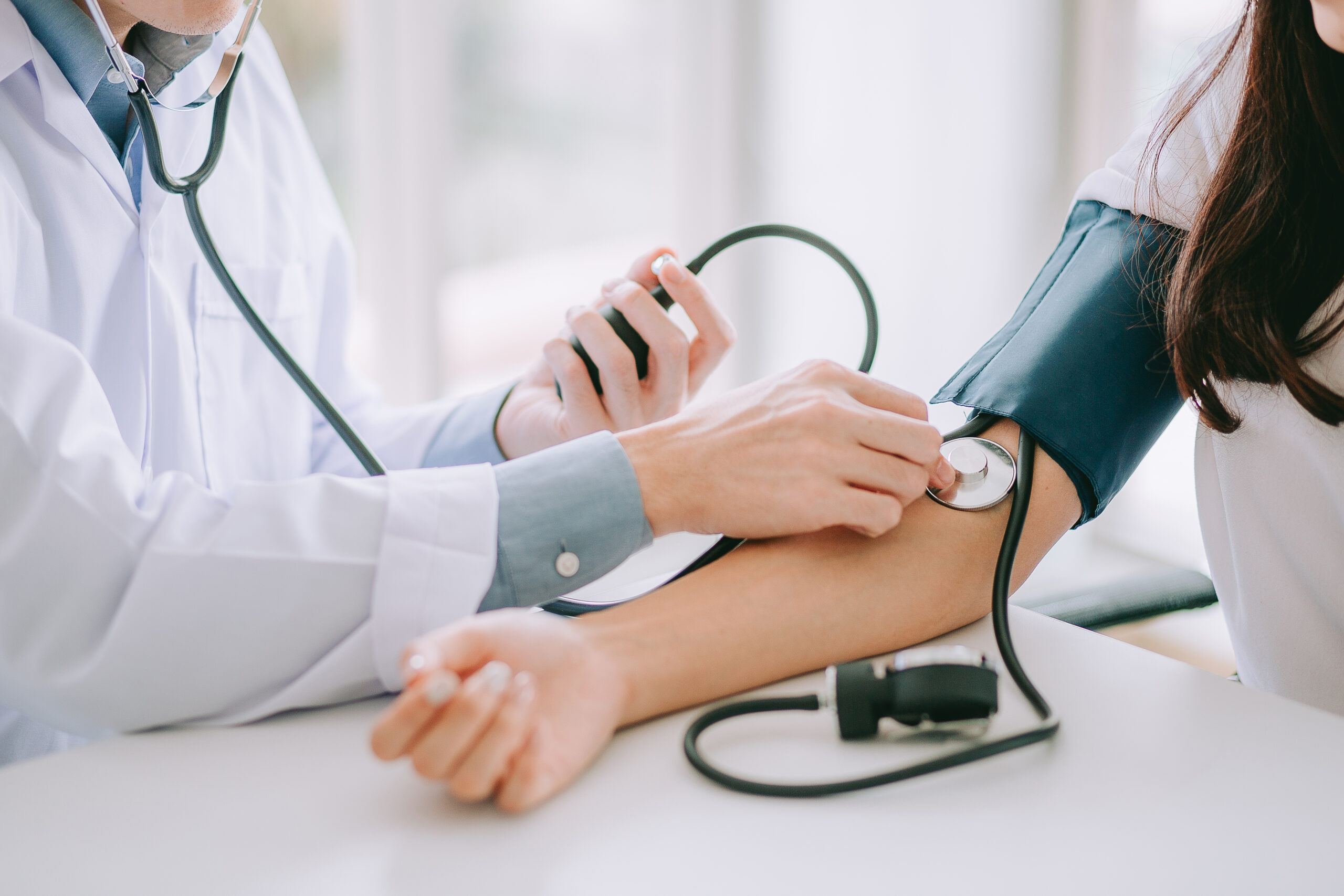
A condition commonly known as high blood pressure (hypertension) is when long-term forces generated by the blood against your artery walls are high enough to eventually cause health problems.
As your heart pumps blood, your blood pressure is influenced by blood flow resistance in your arteries as well. Higher blood pressure is caused by a smaller heart and narrower arteries. Millimeters of mercury (mm Hg) are used for measuring blood pressure. The number consists of two parts.
- (Systolic pressure) is the top number. This first number indicates how high the blood pressure is in your arteries when your heartbeats.
- (Diastolic pressure) is the bottom number. Your second number measures blood pressure in your arteries between each heartbeat.
It is possible for high blood pressure to go undiagnosed for years. Your risk of heart attack and stroke increases when your blood pressure is uncontrolled. The good news is that high blood pressure is easily detectable. Likewise, your doctor will be able to help you control your high blood pressure once you are aware of it.
Symptoms
Even if blood pressure readings reach dangerous levels, most people with high blood pressure do not display any symptoms. There are some people with high blood pressure who experience headaches, shortness of breath, and nosebleeds, but these aren’t specific to high blood pressure and are usually not seen until the condition has become severe or even life-threatening.
When to see a doctor
A routine doctor’s appointment will likely include taking your blood pressure.
After age 18, visit your doctor every two years to get your blood pressure measured. Ask your doctor for a blood pressure reading every year if you are 40 or older or if you are 18 to 39 and at a high risk of high blood pressure.
If there’s a difference between the blood pressure in both arms, both should be checked. A suitable arm cuff is essential. In case of high blood pressure or if you have other risk factors for heart disease, your doctor may recommend more frequent readings. Blood pressure is usually measured as part of a child’s yearly examination at age 3 and older.
There are many ways to get a free blood pressure screening in your community if you don’t see a doctor regularly. Many stores will also offer you free blood pressure machines.
In pharmacies, for example, you can find machines that measure blood pressure and provide some helpful information, but they might have certain limitations. It is important to measure the cuff size properly and to use these machines correctly for accuracy. Take your blood pressure at a public machine according to your doctor’s instructions.
Causes
High blood pressure comes in two forms.
Primary (essential) hypertension
High blood pressure doesn’t have an identifiable cause in most adults. High blood pressure of this type, called primary (essential) hypertension, usually develops gradually over several years.
Secondary hypertension
An underlying condition can cause high blood pressure in some people. In primary hypertension, the blood pressure rises gradually, whereas in secondary hypertension, the blood pressure rises suddenly. Secondary hypertension can be caused by a variety of conditions and medications, including:
- The obstructive sleep apnea syndrome
- The disease of the kidneys
- Tumors of the adrenal gland
- Hypothyroidism
- Blood vessel defects that you are born with (congenital)
- There are certain medications, such as birth control pills, cold remedies, decongestants, and over-the-counter pain relievers, that can lead to a bad reaction.
- Cocaine, amphetamines, and other illegal drugs
Risk factors
Risk factors for high blood pressure include:
- Age. With age, you are more likely to develop high blood pressure. Generally, men have higher blood pressure until about the age of 64. High blood pressure is more common in women after they reach the age of 65.
- Race. African Americans are more likely than whites to develop high blood pressure at an earlier age, which is why it’s more common among them than among whites. African-Americans are also more likely to suffer serious complications, such as strokes, heart attack,s and kidney failure.
- Family history. Families with high blood pressure are more likely to have it.
- Being overweight or obese. Oxygen and nutrients are delivered to your tissues by blood the more you weigh. Your blood vessel pressure increases as your blood flow increases through your vessels.
- Not being physically active. The heart rate is higher in people who are inactive. A higher heart rate requires your heart to work harder, putting more pressure on your arteries. Overweight is also associated with a lack of physical activity.
- Using tobacco. In addition to raising your blood pressure immediately, smoking or chewing tobacco contains chemicals that can damage your arteries’ lining. Heart disease can result when your arteries become narrowed. The risk of heart disease can also be increased by second-hand smoke.
- Too much salt (sodium) in your diet. Your body can retain fluid if you eat too much sodium, which increases your blood pressure.
- Too little potassium in your diet. Potassium balances sodium levels in your cells. For good heart health, potassium balance is crucial. A lack of potassium in your diet or a loss of potassium from dehydration or another health condition could cause sodium to build up in your blood.
- Drinking too much alcohol. In the long run, drinking heavily can cause damage to your heart. Women who consume two or more drinks a day may experience lower blood pressure.
Moderation is key when it comes to drinking alcohol. Women should have no more than one drink a day, and men should have no more than two drinks a day. Twelve ounces of beer, five ounces of wine,, or 1.5 ounces of 80-proof liquor is one drink. - Stress. An increase in blood pressure can be caused by high levels of stress. In addition to eating more, smoking and drinking alcohol, stress-related habits can increase blood pressure.
- Certain chronic conditions. Diabetes, kidney disease, and sleep apnea are other chronic conditions that can increase blood pressure.
Despite the fact that high blood pressure tends to be more common among adults, children are also at risk. There may be problems with the kidneys or the heart that result in high blood pressure in children. Poor lifestyle habits, including a lack of exercise and an unhealthy diet, cause high blood pressure in an increasing number of kids.
Visit Our Office
Location
2940 FM-2920 Suite#150
Spring, TX 77388
Fax: (281) 730-5919
Hours
Monday – Thursday
8:00am – 5:00pm
Friday
8:00am – 1:00pm
Saturday/Sunday
CLOSED

